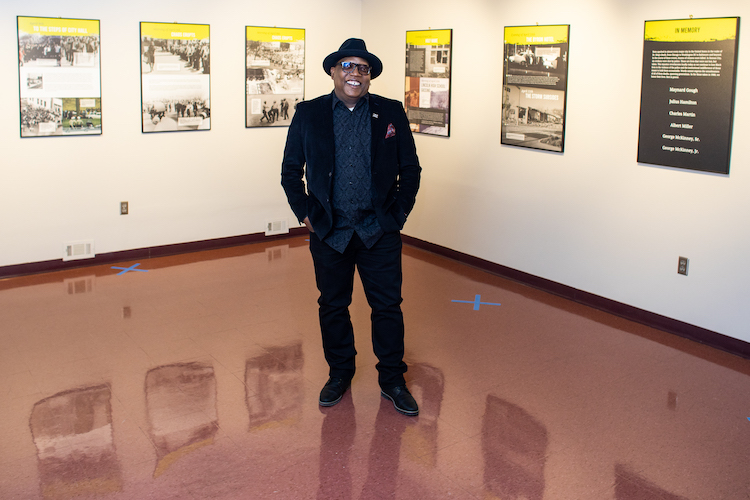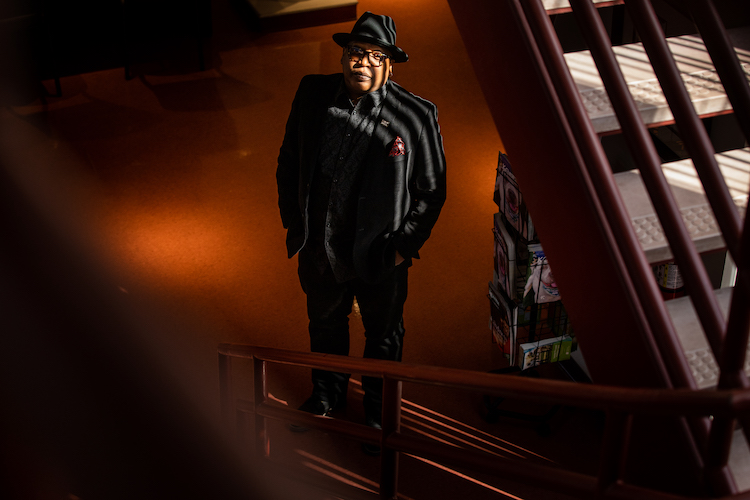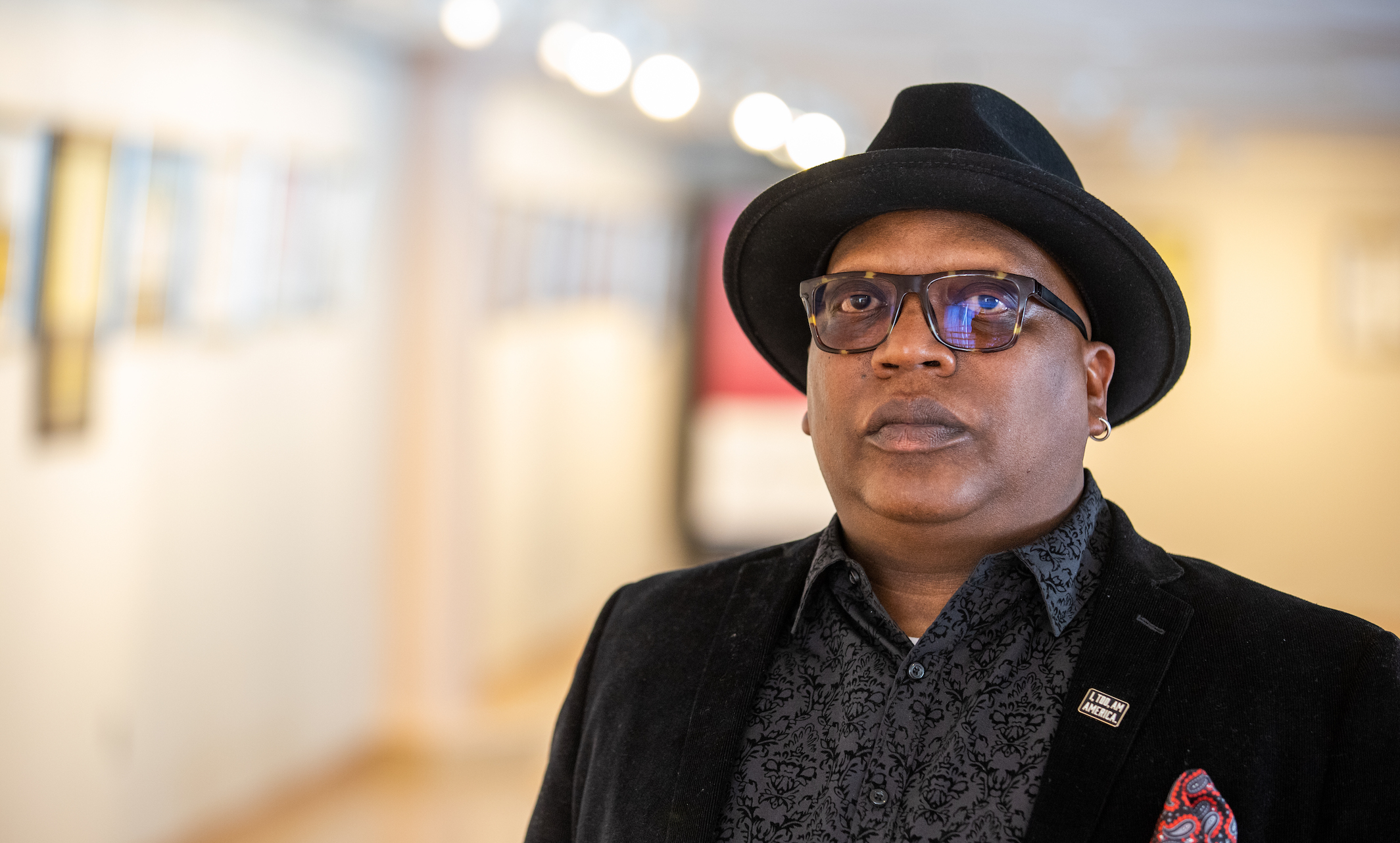Glenn North (MFA '20), the first poet laureate of the 18th and Vine district and executive director of the Bruce R. Watkins Cultural Heritage Center, wrote a poem based on Rudyard Kipling’s “If” for his cousin, Don Cheadle, to read in his UMKC commencement speech. While this may have introduced people to his work, he has a long history writing – and reading – his poetry in the community.
“Don and I talked about ideas for his speech,” North says. “He asked me if I had something that fit. I didn’t, but there’s so much wisdom in Kipling’s ‘If.” My grandmother gave me the poem when I was young. I still use it as a beacon.”
Often in his career as a poet, North has responded to images or concepts – some provided from friends as prompts – to create his poems.
The painting, “Lynch Family” by Joseph Hirsch, with its bold, mottled cobalt blue background, features a Black woman holding her baby against her shoulder in one hand – his hand raised and wrapped around a rattle – while her face rests in her other hand. It’s a striking image of innocence and despair.

North feels empathy is an important component of being a writer.
“I never felt the latitude to write about a daffodil,” North says. “I’ve felt a responsibility to respond to the triumphs and the tragedies of the Black experience.”
Along those lines, while North participated in leading classes and youth poetry workshops and was grateful for the work and experience, he began to feel as if he needed to focus his attention on writing for himself.
“I was frequently writing for hire, and I was fortunate to be able to generate revenue, but it’s a different process. I had to start saying, ‘no.’ At that point I needed to exercise my voice.”
“I never felt the latitude to write about a daffodil,” North says. “I’ve felt a responsibility to respond to the tragedy of the Black experience.”
He found connection with other Black poets through a fellowship with Cave Canem. The organization’s founder, Cornelius Eady and Toi Derricote, created the annual workshop for emerging Black poets and pairs them with veteran writers and provides book-publishing opportunities.
“That’s where I found my writing community,” North says. “’Cave Canem’ is a Latin phrase which translates as ‘Beware the Dog!’ The organization’s mission is to protect the interests of Black poets as fiercely as a dog protects its owner’s property. In so doing, more Black poets will be added to the canon of literature.”
Following the Black Lives Matter demonstrations last year and the revelation that the extent of what some believed was a fringe white supremacy movement was far more prevalent and organized than many people understood.
“I view last year as a cleansing of sorts. If you want clean clothes, you can’t just put them in the washing machine soap and water, you need an agitator. Last summer’s uprising and unrest was necessary for reform. I hate the way it happened, but it brought attention to how Black people are treated by the police.”
“As someone who loves language, I believe some of the terminology we use has helped to change attitudes,” he says. “For instance, if you call a white person racist, they will vehemently resist that label, but if you talk to them about white privilege, they begin to understand that privilege is connected to a racist power structure. At that point, their eyes begin to open. Then we can begin to move toward progress and equity.”
Beyond his poetry, North is engaged in the community through his role as executive director of the Bruce W. Watkins Heritage Center. He’s focused on raising the center’s visibility and expanding its role in the community.

For Black History Month, the center will host an exhibit, Eight Days in April: The Story of the 1968 Uprising in Kansas City, in partnership with the LaBudde Special Collections at the University of Missouri-Kansas City library and the Prospect Business Owners Associaton.
“There’s a lot going on behind the scenes,” North says. “By 2022, we will roll out new programs that will engage the community in a meaningful way.”
North wants the community center to help heal racial trauma.
“A couple of years ago, communities were removing monuments to systemic racism. These monuments say a lot about who we are.
“I view last year as a cleansing of sorts. If you want clean clothes, you can’t just put them in soap and water. You have to agitate.”
In Germany, there are no statues of Nazis statues or flags with swastikas waving around, but there are stumbling stones outside the houses where Jewish people were taken. We need to ask, ‘What do we allow to represent who we are?’ and study that.”
As a member of the Community Remembrance Project, one of North’s current projects is the re-installation of the Levi Harrington Memorial in Case Park in Kansas City. Harrington was a victim of lynching. In 1882, he was falsely accused of shooting a police officer. He was abducted from police custody and hung from the Bluff Street Bridge. He was one of at least 60 victims of racial terror lynching in Missouri.
“The same brand of hate that led to the lynching of Mr. Harrington was on display the night the perpetrators vandalized the marker” North says. “The work I do at the center and the work I do as a poet is an effort to combat racism in all its manifestations.”

